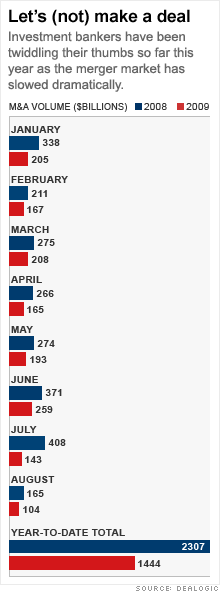Companies playing 'Let's make a deal'
Though Cadbury rejected Kraft's takeover bid, the offer is the latest sign that companies may once again be willing to grow through acquisitions.

NEW YORK (CNNMoney.com) -- When Kraft offered $16.7 billion for Cadbury over Labor Day weekend, the deal was immediately shunned by the British candy giant.
Still, it's the thought that counts, right? And some think Kraft's bid may signal a return to the lost era of companies playing "Let's Make a Deal" -- a hopeful sign that the recovery is near.
In the last few days of August, the Walt Disney Co. (DIS, Fortune 500) agreed to buy Marvel Entertainment (MVL) for $4 billion, oil services company Baker Hughes (BHI, Fortune 500) announced it was acquiring rival BJ Services (BJS, Fortune 500) for $5.5 billion and Qatar Investment Authority bought a 5% stake in Volkswagen for $4 billion.
The surge of deals a little over a week ago pushed August's global mergers and acquisitions total just past $100 billion -- the lowest monthly total since August 2003, according to research firm Dealogic.
It's been a slow year as well, with deal volume through August down 37% from the same period last year. Tight credit markets and pessimism about the economy have been the biggest reasons for the M&A downturn.
But September has gotten off to a promising start, with eBay's (EBAY, Fortune 500) announcement that it will sell 65% of its Skype Internet phone business to a group of private investors for nearly $2.8 billion. And after Cadbury rejected Kraft's (KFT, Fortune 500) offer, Hershey Co. (HSY, Fortune 500) reportedly expressed interest in bidding for its rival.
Signs of the recovery: Some say the trend of the past two weeks signals a return of lost confidence and a sign of a greater recovery trend.
"Now that the housing market is close to stabilizing and unemployment numbers aren't falling by as much, companies are becoming more convinced that we've seen the bottom," said Oliver Brahmst, head of the mergers and acquisitions practice group at law firm White and Case. "Companies have a greater confidence that they'll see earnings growth, and they're becoming more willing to do a deal."
Experts say businesses have begun to move away from their insular strategies of the past year and are beginning to branch out.
"Not everyone will agree if we've hit a bottom or not, but most agree that it's time to move forward with their strategic plans," said Bob Filek, a partner in the transactions services group for PriceWaterhouseCoopers. "There's been a change in attitude among the board and executives of companies."
Filek said that over the past year, companies had been forced into a bunker mentality of building cash and keeping costs low to prepare for the uncertainty ahead. But there has been a noticeable change in the past few months, with more companies willing to seek out ways to grow again.
One way to accomplish that is through acquisitions. With signs of a recovery mounting, some businesses want to be the proverbial early bird that gets the worm and are rushing to get deals done while valuations are still low.
"If the general economy picks up, prices will pick up as well," said Brahmst. "There's always a risk / reward factor, but I'm sure that the smart money is looking very hard at acquisitions right now."
A 'new normal': Brahmst said he expects the health care, energy and oil industries to lead the M&A recovery, with consumer industries like retail lagging behind. He also expects a pick up in purchases of companies out of Chapter 11 as bankruptcy filings pick up.
But few are willing to say the recent slew of mergers and acquisitions will mean a return to the massive amount -- or size -- of some of the deals done earlier this decade.
"There is a building consensus that we've seen the worst pass by, but we're not going to see the feeding frenzy of years past where every private equity firm does every deal that comes down the pike," said Jim Grien, president of investment banking firm TM Capital. "The changes we've seen in the world are reasonably permanent -- there's going to be a 'new normal.'"
Though there is some anecdotal evidence that businesses have been able to secure more loans lately, there is an even wider consensus that the credit market itself is facing a "new normal."
With that in mind, a modest pace of deals makes sense in the current credit environment. The financing still isn't there for big leveraged buyouts. That means the mega deals of the past years aren't yet feasible -- and it may be a long time before they are feasible again. ![]()

